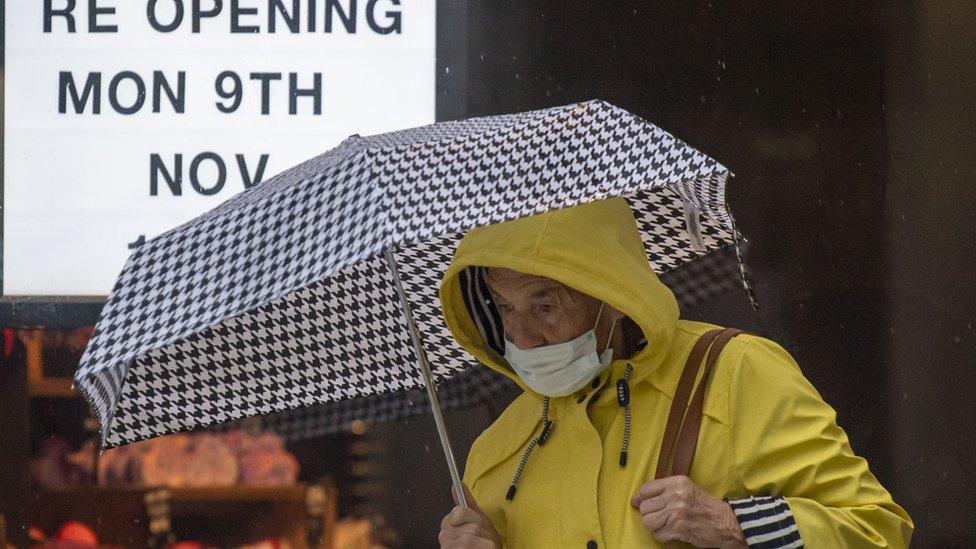Covid in Wales: Hospital numbers continue to rise
- Published
- comments
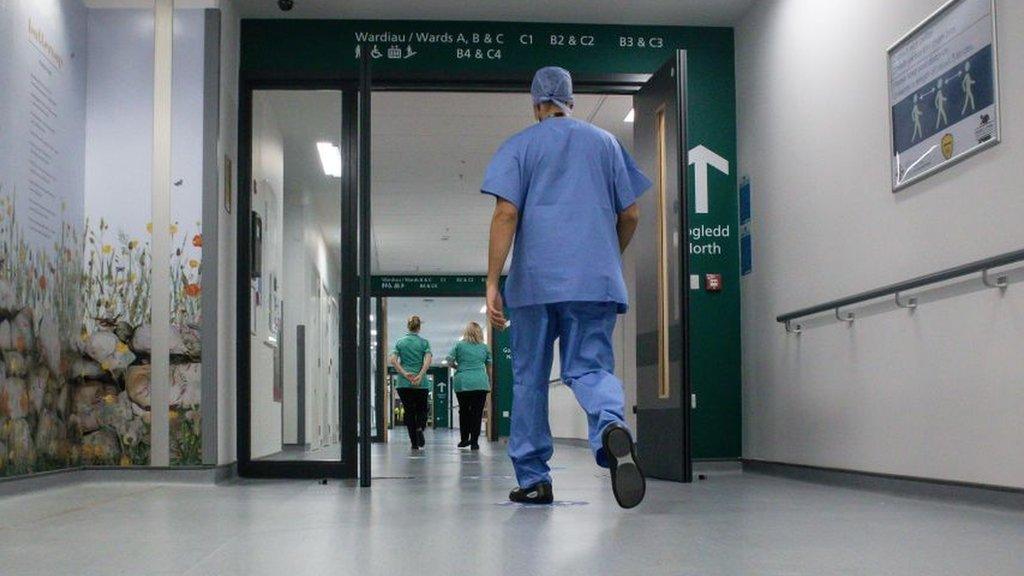
Grange Hospital, Cwmbran now has more Covid patients than non-Covid patients in critical care
Hospital numbers involving Covid-19 patients are continuing to climb in Wales.
Figures from Digital Health and Care Wales, which cover the weekend and Monday, show the daily average of those with confirmed Covid-19 in hospital beds has risen by 41% in a week.
Aneurin Bevan health board has Covid patients outnumbering non-Covid patients in critical care.
But figures remain comparatively low to the same point in the second wave.
One consultant, Dr Ami Jones, said many patients were unvaccinated, describing Monday as a "frustrating day".

A rise in patients in hospital beds
When we just look at patients testing Covid-positive, there were 381 across hospitals in Wales on Monday - with Cwm Taf Morgannwg having 91 of these and another 89 in the Betsi Cadwaladr area in north Wales.
Cardiff and Vale, Aneurin Bevan and Hywel Dda health boards also had more than 50 patients each.
This is 76% lower than in the peak in January, and around a third of the number in hospital at the same point in the second wave, although there was a record low of just seven patients on 27 May.
When we look at the daily average, this was 344 confirmed Covid patients on Monday, a 41% rise on the average the week before.
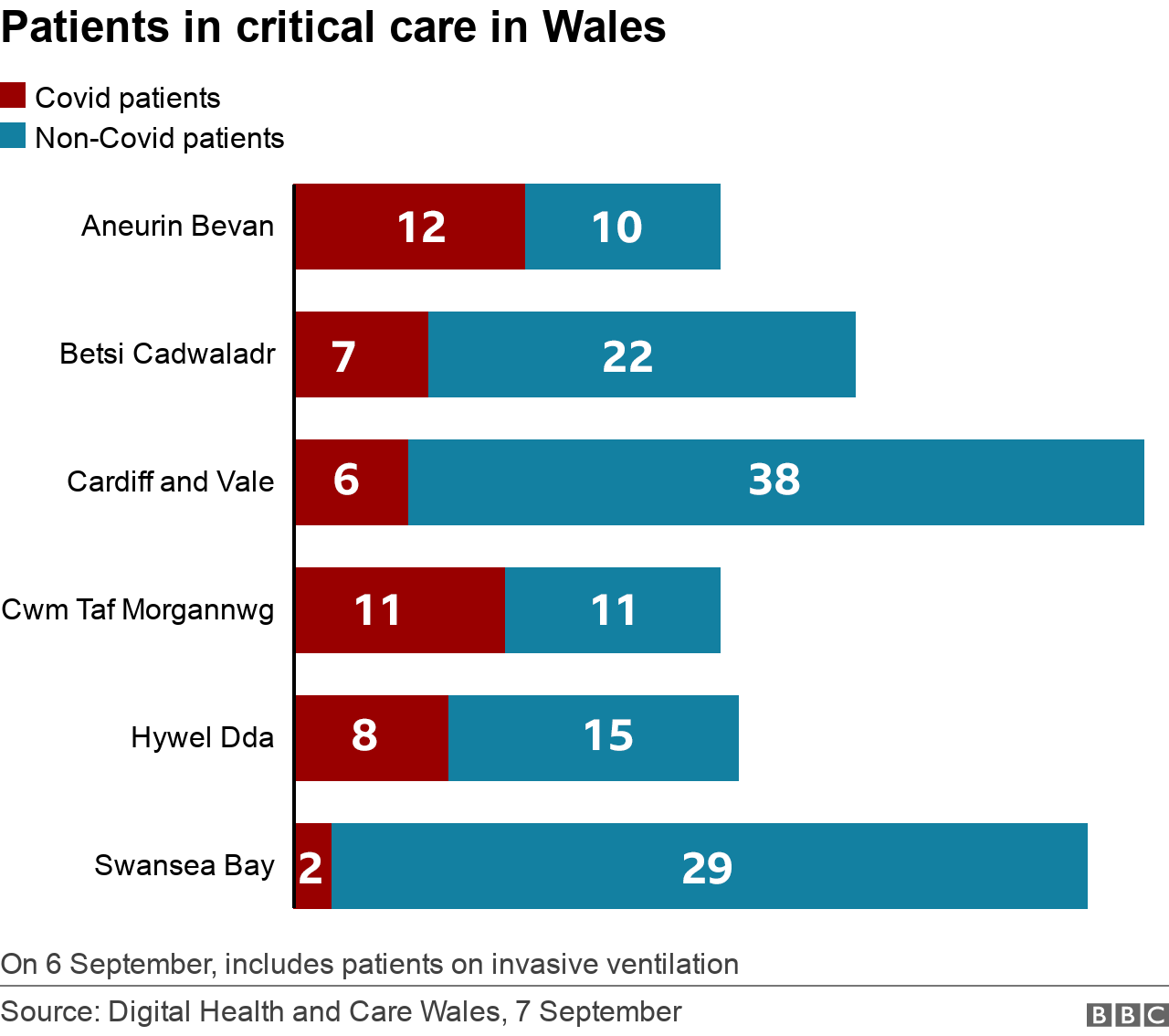
Two health boards see Covid pressures in critical care
There are 46 patients with Covid on critical care or on ventilation. This compares to 40 in critical care the week before. There were 76 Covid patients in critical care at this point in the second wave and at the peak in January there were 150.
Aneurin Bevan now has more Covid patients than non-Covid patients in critical care; there is an even split in Cwm Taf Morgannwg but non-Covid patients outnumber Covid patients in other health boards' ICU units.
One of the health board's critical care consultants pleaded with people to get the Covid vaccine.
Dr Jones said the largest part of the Grange University Hospital in Cwmbran's intensive care unit had "flipped" and was now mostly made up of Covid patients.
Dr Jones said many were unvaccinated.
Dr Jones, who has repeatedly urged people to get vaccinated against Covid-19, said Monday was a "frustrating day" for staff at Aneurin Bevan University Health Board in south-east Wales.
On social media she said: "We "flipped" the largest part of the unit from Amber (non Covid) to red (Covid).
"Covid patients now make up the majority of our patients on the unit."
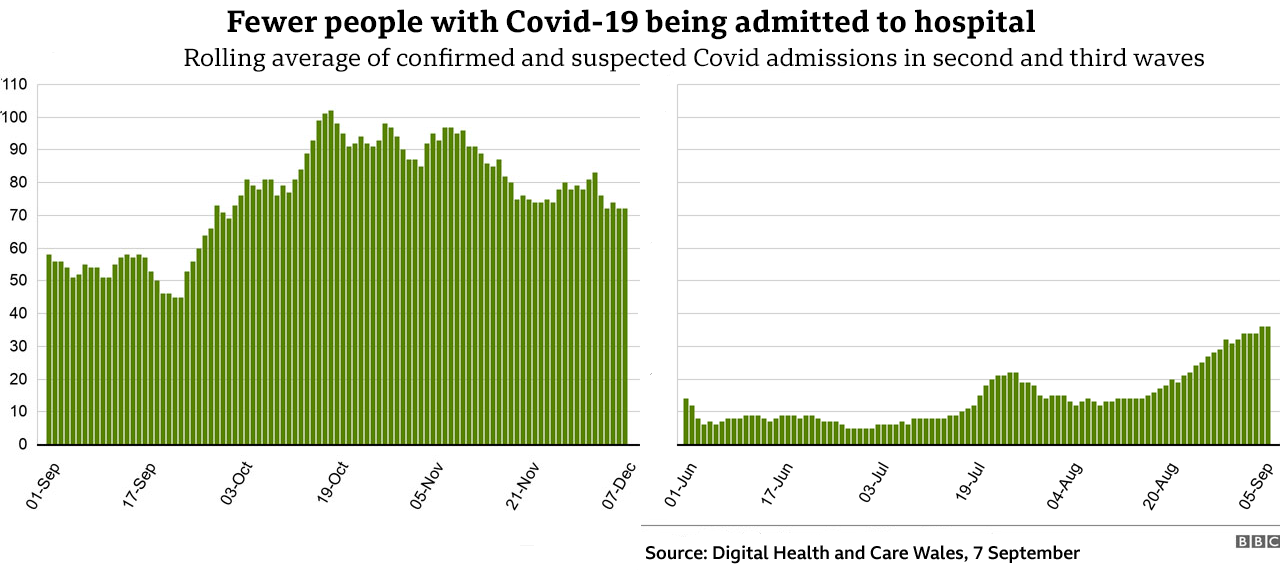
Admissions were twice as high in the second wave
Admissions to hospitals of confirmed and suspected Covid-19 cases were running at a seven-day average of 36 on 6 September, compared with 32 a week ago. This is highest level since late March.
There were 34 admissions on Monday - including nine in Cwm Taf Morgannwg.
Covid admissions make up 3.7% of all hospital admissions, while at the same point in the second wave, Covid admissions were exactly double in number on average.
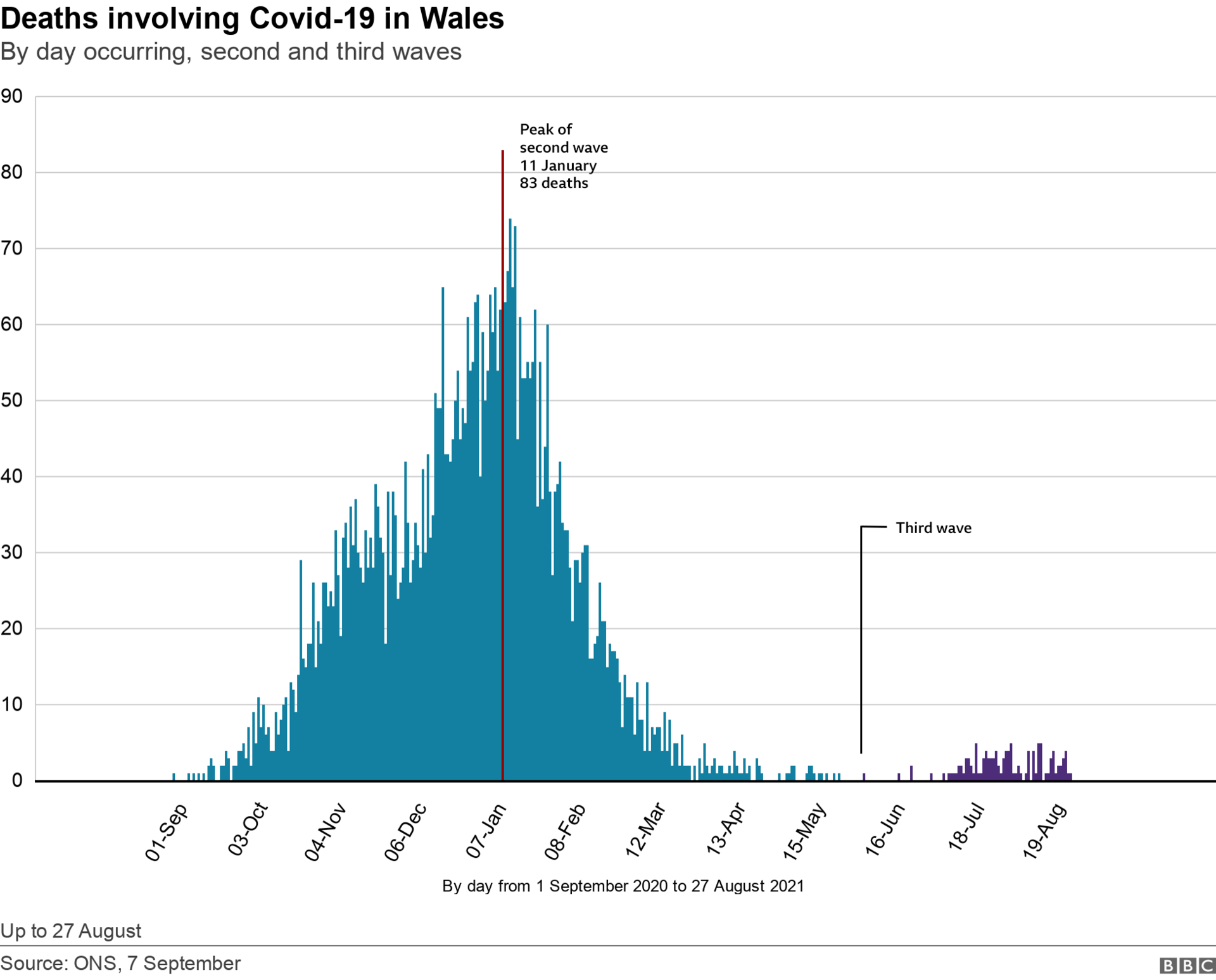
Covid-19 deaths continue to fluctuate around a low level
There were 16 deaths registered involving Covid in Wales in the week ending 27 August, according to the Office for National Statistics., external
This was two fewer than the previous week, although numbers have been fluctuating around a similar range for the last six weeks, as we reach more than three months into the pandemic's third wave.
They are still far lower than during the pandemic's earlier waves.
Half of the weekly deaths were in hospitals in the Betsi Cadwaladr health board area. These involved three residents from Flintshire, two from Gwynedd, and the others were in Conwy, Denbighshire and Wrexham.
There were two deaths involving Neath Port Talbot residents in hospital, two hospital deaths in Cardiff and deaths in hospital and a private home in Rhondda Cynon Taf.
This takes deaths in the valleys county to 900 over the course of the pandemic.
There was a care home death in Carmarthenshire and a hospital death involving a Caerphilly resident. For the 12th week in succession, there were no deaths involving Covid for anyone living in Powys, although one was registered in the last week and is likely to be counted in next week's figures.

What about 'excess deaths'?
So-called excess deaths, which compare all registered deaths with previous years, were above average for a sixth week in succession. They had been below average for 17 of the previous 24 weeks. There were 43 deaths above the five-year average in the latest week.
Looking at the number of deaths we would normally expect to see at this point in a typical year is seen as a reliable measure of the pandemic.
The number of deaths from all causes in Wales rose to 616 in the week ending 27 August, with 2.6% mentioning Covid on the death certificate.
Deaths were also above average in all UK nations for the week, while deaths involving Covid rose in seven out of the nine English regions, with the largest increase in south-east England.
Excess deaths in private homes across England and Wales were nearly a third above average, in the latest week.
When looking across the course of the pandemic so far, there have been 53,821 deaths from all causes in Wales, with 8,018 (14.9%) mentioning Covid-19 on the death certificate up to 20 August. This was 5,333 deaths above the five-year average.
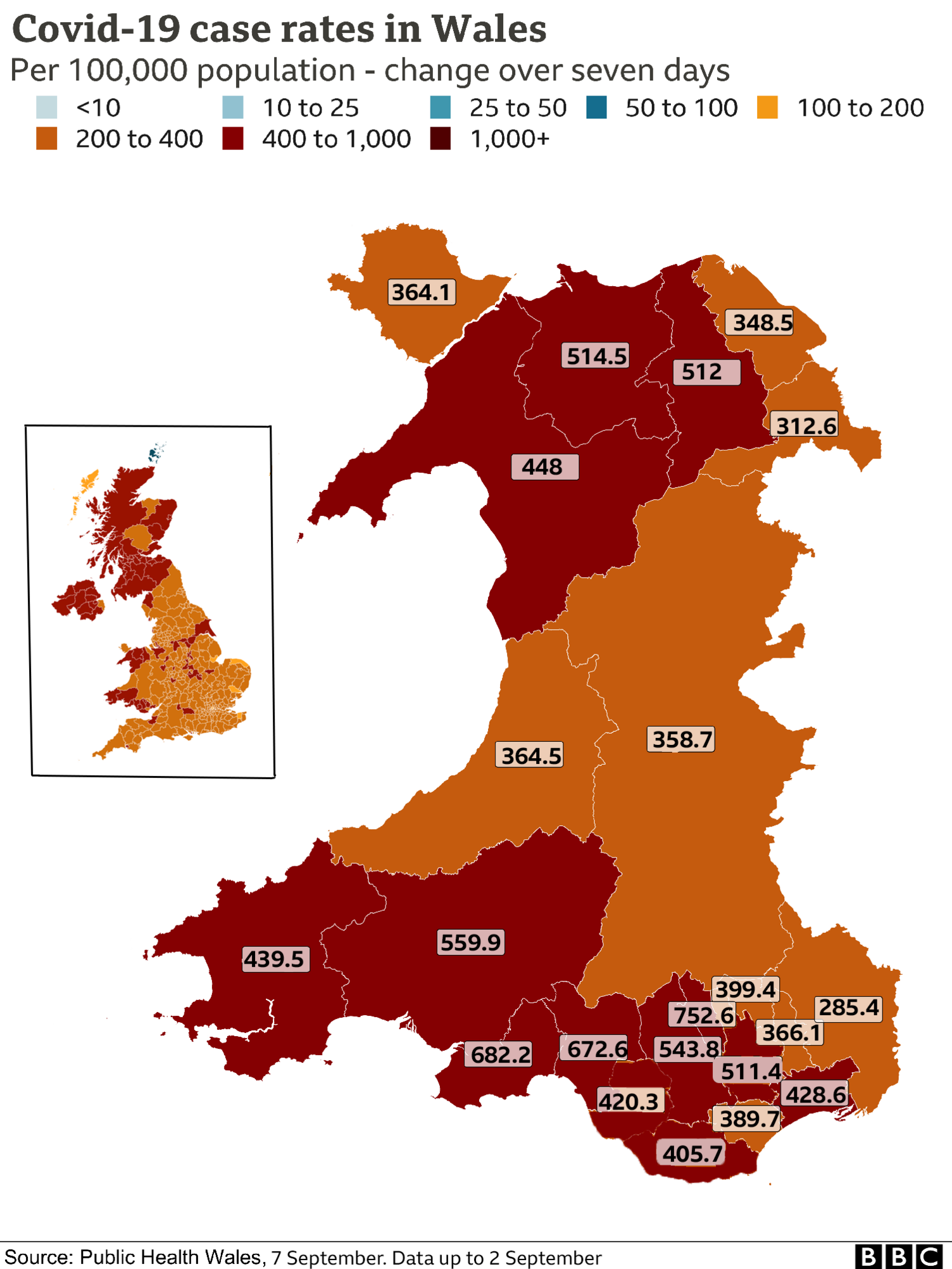
Wales' Covid case rate has risen to 468.6 cases per 100,000.
Merthyr Tydfil has the fastest-rising case rate in the UK in the last week which is now 752.6 cases per 100,000.
Public Health Wales reported three more deaths on Tuesday. There have been 15 deaths in the last seven days.
The total vaccinated with the first dose has risen to 2,362,580 (74.5% of the total population), while 2,192,341 (69.2%) have been fully vaccinated.
Related topics
- Published28 May 2024

- Published4 July 2022
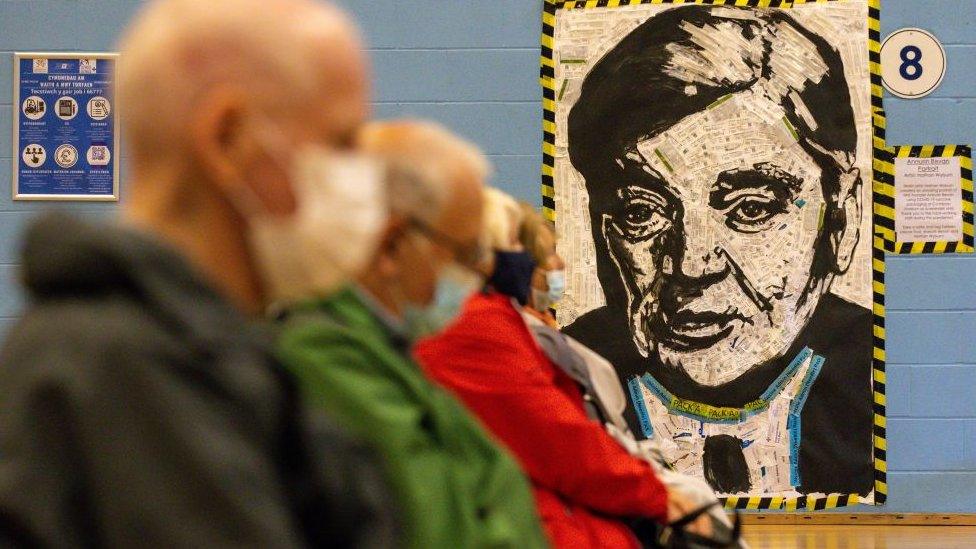
- Published9 August 2021
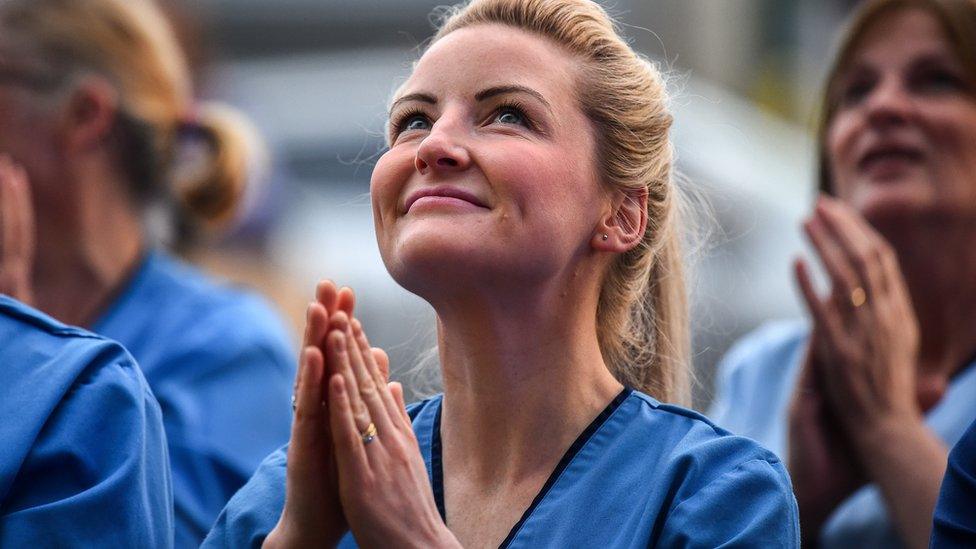
- Published7 September 2021
